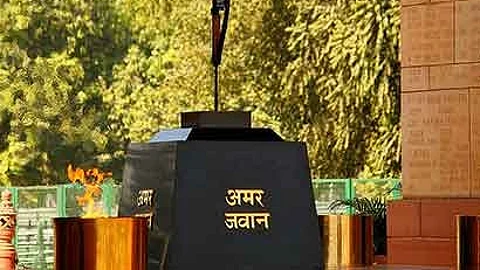
- Home
- Live Blog
- Breaking News
- Top Headlines
- Cities
- NE News
- Sentinel Media
- Sports
- Education
- Jobs

Naik Subedar Ramesh Chandra Rai, a dedicated soldier in the 6 Assam Regiment, gave his life on July 28, 1993, during Operation Rakshak. This ongoing counter-insurgency and counter-terrorism operation in Jammu and Kashmir was launched to combat insurgency and terrorism. Ramesh's death, while battling Pakistani terrorists, marked a tragic chapter in the lives of his family and his community.
In 1993, communication was not as instantaneous as it is today. Raimati, Ramesh’s wife, recalls receiving the devastating news via telegram. "There was no telephone like today in 1993," she shares. Her grief was compounded by the fact that, just months before, she had lost her mother. "It was a double blow," she says, remembering how she had written to her husband about her mother’s passing, only to receive his letter a few months later on the day of his own death.
Ramesh Chandra Rai was more than just a soldier; he was a loving husband and father. Raimati fondly remembers how he always dedicated his time to his family when on leave. "He loved us a lot," she recalls. "Whenever he came home, he played with the kids and never went anywhere else." A simple man, Ramesh was not particular about food and enjoyed spending time working on the farm, cultivating land and singing with his family.
The loss of her husband left Raimati with the responsibility of raising their two children on her own. "After his death, I was worried about how I would run my family," she admits. However, the support of her in-laws helped her cope with the tragedy. Raimati chose to stay home to care for her young daughter while her son, later inspired by his father, joined the Army. The Armed Forces provided educational support for her children and even offered Raimati a job, though she declined to focus on her children.
Raimati’s experience after her husband's death highlights the support the Armed Forces provided to her family. She was given a family pension, and her son’s education and career were taken care of by the Army. However, she mentions that she received no assistance from the Assam government. The Armed Forces also helped her perform the Śrāddha rituals for her husband, ensuring that she was not alone during these difficult times.
Ramesh Chandra Rai was not only remembered by his family but also by his community and regiment. Raimati recalls how the villagers cried upon hearing the news of his death. He was the first martyr from their area, and his bravery continues to be honored to this day. "The villagers still love and respect him," she says. "He continues to live in the hearts of his family, friends, and members of his regiment."
Even after nearly three decades, the Armed Forces continue to honor Ramesh’s sacrifice. Raimati shares that whenever there is a program or meeting of the Armed Forces, her husband is remembered with respect. "I feel very proud of his supreme sacrifice," she says. "But I also feel sad. Had he been alive, he would have been standing here with me today."
Raimati still cherishes the memories of her husband, despite the passage of time. "Twenty-nine years have passed since his death, so some memories have become clouded, but I only remember the good times," she reflects. The day of his death remains etched in her mind, but she continues to hold on to the happy moments they shared together as a family.
Ramesh's legacy lives on in the hearts of his family, friends, and the community. His sacrifice is an example of bravery and selflessness, and his story continues to inspire those who knew him. "He was very generous, honest, and devoted to his family," Raimati recalls. Ramesh’s memory is honored not only by his loved ones but by the Armed Forces and the villagers who continue to speak of him with great respect.
Also Read: The Freedom to Choose
Also Watch: